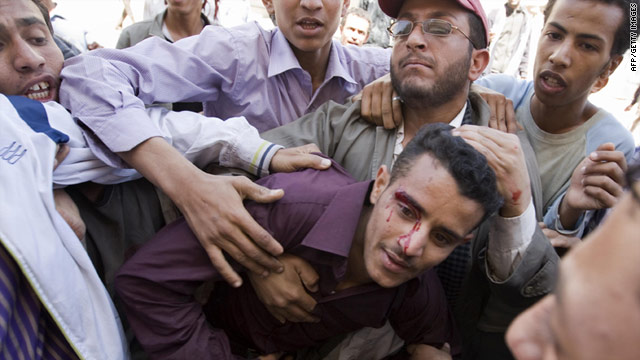Scammer
Banned

-- Anti-government demonstrators took to the streets of the capital Sanaa following Friday's midday prayers, ushering in a second week of unrest to the Middle Eastern nation.
Protesters gathered around Sanaa University as government security forces blocked some streets and medical teams staged, waiting for potential casualties.
The developments came as hospital and local government officials upped the death from Thursday's violence to four people.
It was unclear whether a call for calm in the midst of the violence by the country's most influential religious cleric, Sheikh Abdulmajeed Al-Zindani, would be heeded. On Thursday, he said religious clerics in the country were calling for a unity government.
An official government source expressed his surprise at the attention the unrest was generating worldwide, accusing some of the media of "false, misleading and biased information," the state-run Saba news agency reported Thursday.
The Committee to Protect Journalists reported that "at least four photojournalists were attacked, beaten and had their cameras confiscated" by pro-government supporters at the protests.
The latest casualties bring the death toll from Wednesday and Thursday in Aden to five, after shots were fired into a crowd of anti-government protesters in the Al-Mansoora district.
Aref al-Qubati, a participant who said one of the victims was a friend, told CNN that police fired to disperse protesters.
Longtime Yemeni President Ali Abdullah Saleh has called for an investigation into the violence in Aden and Vice President Abdu Rabo Mansour Hadi met with the governor Thursday, Saba reported.
The top European Union foreign policy official, Catherine Ashton, is "very concerned" about the events in Aden, her representative said in a statement Thursday.
Ashton "strongly deplores the loss of life and violence and calls for calm and restraint of all parties," the statement said, calling for "genuine, comprehensive and inclusive national dialogue."
And in Yemen's capital, Sanaa, at least 20 people were injured in clashes there between stone-throwing pro- and anti-government demonstrators, opposition lawmaker Ahmed Hashid said Thursday. Police at the scene did not try to intervene, he said.
In Taiz, thousands have been taking part in demonstrations that entered a seventh day Friday.
Saleh met with his National Defense Council on Wednesday to discuss developments in Yemen, Saba reported.
The council "stressed all should practice their rights according to the constitution, in a peaceful way and without violence, chaos, sabotage and lawbreaking."
Saleh also spoke on Wednesday with Bahrain's King Hamad bin Isa Al Khalifah, whose country is also embroiled in unrest, Saba reported.
"He pointed out that there are schemes aimed at plunging the region into chaos and violence targeting the nation's security and the stability of its countries," according to Saba. "Those who commit acts of disorder and vandalism (are) simply implementing suspicious foreign agendas ..."
The report didn't suggest who might be behind the agendas.
Yemen is among several Middle Eastern nations convulsed by daily protests after the revolts that toppled the leaders of Tunisia and Egypt in recent weeks. Anti-government protesters have called for the ouster of Saleh, who has ruled the country since 1978.
The country has been wracked by a Shiite Muslim uprising, a U.S.-aided crackdown on al Qaeda operatives, a secessionist movement in its once-independent south and a looming shortage of water.
In an attempt to quell growing discontent, Saleh has announced that he won't seek another term in 2013 and would postpone parliamentary elections scheduled for April to allow more time for reform talks with the opposition.
